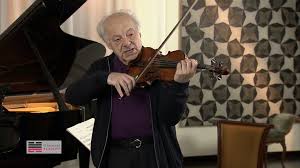Glenn Gould analyses Sviatoslav Richter
mainThis is a lengthy interview that Gould gave to Russian television, which was dubbed over in Russian.
It has been restored with English words.
Richter, as you will hear, contradicted Gould on almost every point he made.






“There are two things I hate: power, and anlysis.” — PIXTEP /RICHTER
It is well known that the two great pianists shared a mutual admiration for one another. At a Gould Moscow concert, when the recital ended, the applause and encores continued for half an hour, and Sviatoslav Richter was seen to clap and cheer long after the general public had become exhausted. After hearing Gould, Richter refused to record The Goldberg Variations. “I could play Bach that well Richter later said to a friend, “but I would have to practice very hard. That is the genius of Glenn Gould.”
I’d be very curious to know why the thumbs down. Is it because of what Richter said? Or is it because they both admired each other? Or might there be another hidden reason to what is reported? Or is it simply someone who dislike both Gould and Richter?
Let’s explore Guiomar Novaes, or Magda Talliaferro, or Artur Rubinstein. They should be remembered.
What is this obsession with Glenn Gould? Richter is by far the greater artist, one of the greatest. Gould is merely a great oddball.
An incredibly untrue statement, Grittenhouse. Both men were giants in their own ways. I’ve made no secret of my admiration for Gould, but I have an equal measure of reverence for the great Richter. I’ve been listening to his recordings of the Beethoven sonatas (particularly the underrated early ones), and they are nothing short of sublime.
I saw this as part of a three hour documentary about Richter which was/is on youtube. Very interesting.
It is enormously interesting and brutally sincere. Unfortunately, Richter emerges from it as a profoundly negative person who only has good words for a couple of violin players, Kagan and Oistrakh, and profound resentment for anyone else including himself. Give me a normal pianist like Lili Kraus (first one that came to mind after Gould’s mannerisms reminded me of his “Mozart”), and keep these two locked up in a secure place.
In Bruno Momsaingeon’s “Sviatoslav Richter: Notebooks and Conversations” Richter praises a number of other musicians, not just the two you named.
I always find the slow speeds of SR’s Schubert Bb maj sonata unbearable
He ought to have stuck to playing the piano (and not Chopin). The pretentious, phoney accent and jestures with the hand, momentary hestitations in speech to suggest he’s not on a script, the verbosity…what a ham.
And Richter makes little more sense. The first movement of the Schubert G major sonata in my opinion is usually taken too quickly (Peter Serkin got it right while very young) but Richter’s is so painfully slow that, I recall, a critic described it as similar to “Chinese water torture”. I greatly admire Gould and Richter at their best in suited repertoire but this conversation and this performance are painful. Richter’s comments are also nonsense. I remember him saying in an interview that the performer ought to be anonymous as an interpreter and just play what’s written. But barring the textbook expression, that’s what’s wrong with most performers. Composers do need the help of an artist, not just an artisan.
But you are aware that this is (pretty obviously) not Gould‘s voice? It had to be re-dubbed as I have always understood it. It sounds to me like a Russian speaker with an excellent command of English. Nevertheless I confess to some degree of sympathy with the rest of your comment.
That wasn’t Gould’s voice.
What is wrong with most performers is that they impose themselves on the music, thus obscuring it.
This was pretty much Richter’s view, of course. My feeling is that there is a very fine line between honest yet powerful musical interpretation and imposing your personal views of what the music is about.
Just to make it more complex, that line moves over historical time — “appropriate style” — and also varies across pieces. Much of the big romantic virtuoso pieces require some sort of egotistical presence, surely? Otherwise, they would sound very lame — since that is an intrinsic part of the musical style. We might even say this for a few pieces by Beethoven and Mozart…
1. It is difficult to compare a genius mind of an ≈40-y.o. Gould to an ≈80-y.o. and very ill Richter. And we will never find out, had Gould lived till his 80’s, what would he say about Richter and/or about Schubert.
2. Two things are clear: a. both men were great artists, and
b. musical perceptions are very personal and change with age!
You mean compare Gould (born in 1932) in his 40s to Richter in his 60s (born in 1914; above Schubert clip is from 1977.)
I gennerally agree with your second point. Both Richter and Gould at their best had few equals no superiors. From my very personal viewpoint, they both had their low points.
What’s the point of having those clips of Richter playing? Do you think the clips of the G major Sonata were contradictory to what Gould was saying (about communicating)? Gould does talk about the extremely slow tempi of his Schubert, but it MIGHT have made sense if they sampled his Bb Sonata, but no…. Jeez, whoever made this should have just given us the Gould interview without the BS.
I like Glenn’s James Mason impression!
That wasn’t his voice.
A lot of what Gould said was accurate even if Richter wasn’t in agreement.
If Richter was able to make Gould forget about his misgivings concerning Schubert’ music ,it might suggest that a lot of other performers, so-called Schubert experts (no names, we can figure out who they are), aren’t doing a very good job.
(One of the most unimpressive recitals I ever attended was an all-Schubert recital given by a world-famous pianist viewed by many, for reasons that have always mystified me, as the “last word” on Beethoven and Schubert).
Ps: great photo, not Gould’s voice.
Why so coy? You must mean Brendel.
Good to be reminded of this old footage. But with the passage of time his Schubert now just seems eccentric beyond words. (I was at the Piccadilly church recital where he played the Schubert G major: half an hour, I believe, just for the opening movt.)
I think both their views are valid.
Since this was certainly not the voice of Gould, it would have been better to omit the dubbing and just let one read the words.
It’s definitely Gould speaking. Poor synching with the film perhaps, but the voice is definitely Gould’s. (BTW: If the voice bothers you, maybe just cancel the audio and read the words.)
Fascinating. Gould is right that Schubert sits right on a knife’s edge; details can easily be rendered as trivial or ornamental that in the right hands somehow become motives of great expressive power. It makes the difference between 45 minutes of boredom and 45 minutes of ecstasy.
And Richter is right that Gould was often full of horses**t.
A number of thoughts come to mind.
1. It has been my privilege to know personally a number of internationally renowned musicians. As a group, they are not the best judges of the quality of their own performances- neither for better nor for worse. And, statistically speaking, they are more likely to underrate than overrate those performances in private conversation.
2. Richter was notoriously self-critical, and it is well-known that, at the time Bruno Monsaingeon made the famous video from which the quotes are taken, Richter was elderly, ill and depressed.
3. Although Gould sounds rather pompous, I agree with his basic point. RIchter had, in my opinion, a unique ability to make the listener hear a piece as if for the first time, no matter how familiar it was.
4. Having played the Schubert G Major sonata myself, and having heard many performances by others, I personally consider this performance to be absolutely cosmic. I stress the fact that opinions of this kind are entirely personal and subjective.
I agree wholeheartedly with point 4. Imogen Cooper is quoted (Wikipedia) as saying the G major is “one of the rare completely serene sonatas that he wrote”. In Richter’s interpretation (and my opinion) it is anything but serene, but instead expressive of the desperation and grief of the already mortally ill Schubert – a great performance and interpretation. As you say, a personal and subjective opinion.
Richter should not have have been allowed within shooting range of Schubert.
An example of two guys who are god-like at the piano and eccentric kooks away from it!
Richter’s playing is preposterous, while Gould’s comments are mostly spot-on in his usual ‘No one has ever noticed or said this before’ way, and Richter’s comments are wholly disingenuous, as with so many people who do not like praise or even being talked about no matter what they do.
I always value Daniel Poulin’s comments on Gouldiana, expert and helpful. These two geniuses were both nuts, pace Georg Szell. Seeing them play was critical to my recital experiene and education.
They were complex, highly idiosyncratic, sometimes exaggerated and larger than life, as with other the great artists. When their gifts lit the music from within, I wanted to be there. Some works were never the same afterward, proof of extraordinary value and evident in their first recordings. It wasn’t “normal” playing; that we can always find, but paranormal, daemonic. Peak performers hav valleys. Only the mediocre are always at their best. J can read the notes for myself, blueprints of masterpieces that have something disrproportionate about thm.
In all of the considerations about the great pianists in this post and in the posts on the Beethoven sonatas here, I don’t recall anyone commenting on the extraordinary talent of Joseph Hofmann who lived until 1957. Some regard him as the greatest pianist ever, but he had a limited recording history and that may explain his being dropped from view.
Or perhaps it’s because he recorded so long ago, and in the last decades of his life, his technique had been ruined by alcoholism. Whereas many of us were able to hear greats like Horowitz and Richter live, and if not on recordings. But I believe Hoffman’s technique was superior to both. Really to anybody’s, since the 19th century at any rate. And while many found his interpretations lacking, I never did, though IMO they don’t hold a candle to Richter’s (I’ve never been much enamored of Horowitz’s).
Josef Hofmann isn’t he first name to ocur in a discussion of Gould Richter, but there are connectios He was a Polish Jew “golden age” virtuoso, last pupil of Anton Rubinstein, and named by Rachmaninoff as the other great pianist besides himself. He influenced or taught Abram CChasins, Shura Cherkassky, and Charles Rosen among others in his years as director of Curtis Institute.. Chasins thought Benno Moiseiwitsch his sucessor, and Hofmann agreed although they are quite different.
Hofmann had a physical constraint, like the other two under review; who doesn’t? His hands were small; he used a cut-cown Steinway keyboard. His explosive dynamics and sudden bursts of speed, together with cas-iron technique gave his playing a hard edge, vut when things worked his results were extraordinary, as in Moszkowski’s :Capriccio espagnole”, the D-minor concerto of his teacher Rubinstein live with Fritz Reiner onducting the Curtis Institute orchestra where he taught and was director for years. Like Rachmaninoff, he distrusted and disliked recording, which in his heyday was primitive and often unsatisfactory, although other pianists managed, but his many live broadcast programs and concertos … Chopin, Beethoven, Rubinstein, some works of his own .. together with test lpressings and acoustic acetates, piano rolls, and some electrical recordings add up to a respectable total and give a good idea of his abilities His entire golden jubilee concert at the Metropolitan Opera House is recorded.
Rachmaninoff dedicated his third concerto to Hofmann, who never performed it, probab;y due to his m small hands, He was an inventor, kept a workshop, and held several patents including one for a windshield wiper inspired by a swinging metronome arm. was, He had an alcohol problem, and his personal life was irregular, as with our other two subjects here.
Very interesting commentary. Thanks.
Youngish Sergei Rachmaninoff to a friend who informed him of Schubert’s piano sonatas, which he evidently did not then know: “Schubert? He also wrote sonatas?” He would bo on go record one with his friend Fritz Kreisler, albeit for violin and piano, the “Duo” sonata, in addition to his transcriptions, and Liszt’s, of several Schubert Lieder.
Grittenhouse, Novaes, Tagliaferro, and Rubinstein are remembered lovingly in at least one house on my street. I saw two pf them play, Rubinstein many times, and count Novaes’s Bach-Siloti Organ Prelude in G minor with terraced dynamics and rousing ending a perfect recital opener, as it was for her at the Curran Theatrein San Francisco about 1958. She and Nelson Freire recorded it, hers well in the lead and more ideal.
The volatile, tempestuous MagdaTagliaferro, Brasilienne like Novaes, toured South America after World War II with her old genius teacher Alfred Cortot in duo-piano recitals I would love to have heard, his only post-War return to the western hemisphere , but I heard him play an enormous recital in Frankfurt-am-Main in Decmber 1952 after his return from a Japanese tour where he made many records for Japanese Victor, now on CD, inluding two splashy Chopin scherzi, one of which he played in Frankfurt. Tagliaferro’s expressive face shown, her dark eyes glittering as she said “Cortot? He .. was … MAGIC!”
I fpfm’t agree Gpuld should have bound himself just to the piano. His Protean gifts over-flowed. His commentaries, articles, interviews and self-interviews, his film “The Idea of North”, unlikely interactions with Stokowski, Bernstein, and Richter, his witty ventroliquies of Slats Grobnick and Sir Nigel Twit-Something bore fruit for all of us. Eh, Daniel Poulin? Why, he even played a Chopin sonata and accompanied Elisabeth Schwarzkopf in Richard Strauss Lieder that she re-reorded with trusty old Gerald Moore as soon as she could. And what of his relation to Grieg? Well,what of it?
https://slippedisc.com/2019/12/how-glenn-gould-played-at-16/
i think Gould is right in distinguishing performers interpreting music (Gould himself) and music being interpreted/channeled by performers (Richter who didn’t contradict Gould that much)
the beauty is there’s no right or wrong as it’s great to experience (by us listeners) both not either